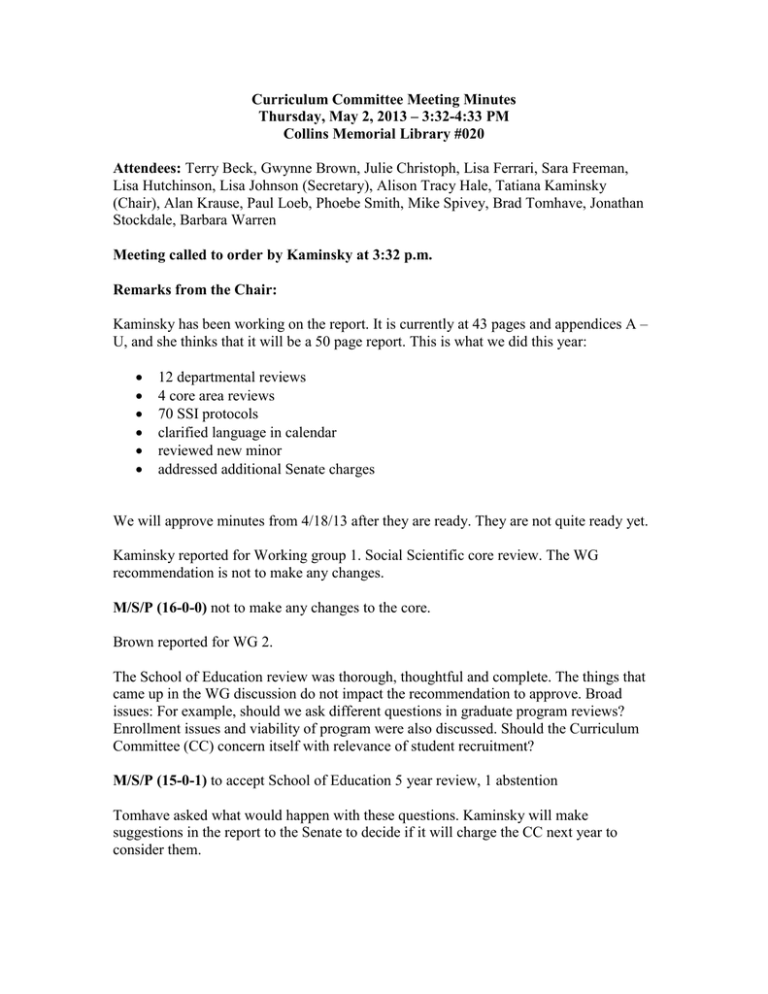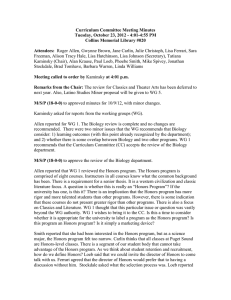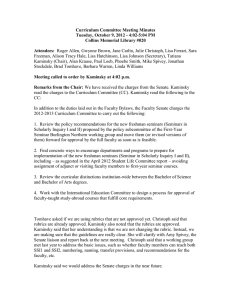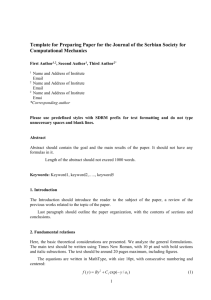Curriculum Committee Meeting Minutes Thursday, May 2, 2013 – 3:32-4:33 PM
advertisement

Curriculum Committee Meeting Minutes Thursday, May 2, 2013 – 3:32-4:33 PM Collins Memorial Library #020 Attendees: Terry Beck, Gwynne Brown, Julie Christoph, Lisa Ferrari, Sara Freeman, Lisa Hutchinson, Lisa Johnson (Secretary), Alison Tracy Hale, Tatiana Kaminsky (Chair), Alan Krause, Paul Loeb, Phoebe Smith, Mike Spivey, Brad Tomhave, Jonathan Stockdale, Barbara Warren Meeting called to order by Kaminsky at 3:32 p.m. Remarks from the Chair: Kaminsky has been working on the report. It is currently at 43 pages and appendices A – U, and she thinks that it will be a 50 page report. This is what we did this year: 12 departmental reviews 4 core area reviews 70 SSI protocols clarified language in calendar reviewed new minor addressed additional Senate charges We will approve minutes from 4/18/13 after they are ready. They are not quite ready yet. Kaminsky reported for Working group 1. Social Scientific core review. The WG recommendation is not to make any changes. M/S/P (16-0-0) not to make any changes to the core. Brown reported for WG 2. The School of Education review was thorough, thoughtful and complete. The things that came up in the WG discussion do not impact the recommendation to approve. Broad issues: For example, should we ask different questions in graduate program reviews? Enrollment issues and viability of program were also discussed. Should the Curriculum Committee (CC) concern itself with relevance of student recruitment? M/S/P (15-0-1) to accept School of Education 5 year review, 1 abstention Tomhave asked what would happen with these questions. Kaminsky will make suggestions in the report to the Senate to decide if it will charge the CC next year to consider them. Brown discussed the School of Education minor. The WG is in favor of approving the minor. There is a good case for need, and there is widespread interest in the minor. There were some questions, however. The WG was skeptical about whether there would be additional pressures on EDU 419 and 420, but John Woodward of the School of Education assured the WG that these were the same students who were already taking those classes. The WG was also concerned about required courses in other areas or programs, because the other areas or programs had not yet signed off on being onboard. However, after discussing these issues with Woodward, Woodward addressed the concerns and now the other areas or programs are committed. The WG was also concerned about why AFAM401 was the only diversity class that was included in the minor. Woodward made a good case for it being specifically relevant to Education, but they are open to other courses being included in the minor, too. He also clarified what else went into the minor. These consist of two 200-level Education courses (.25 units each), EDU419 and 420, field placement internship over two semesters, and two courses outside of the School of Education. He answered the main concerns about the proposal. Discussion: Tomhave asked how many units would be required. Brown said “5.” Tomhave asked if there was discussion about additional or more developmental or brain function type of classes as part of the minor. Brown and Freeman both said that the two psychology courses that could be taken for the minor, PSYC 220 and 221, are both developmental psychology courses. Loeb noted that our programs are multiplying quickly and proliferating rapidly. Loeb suggested that maybe we could ask the Senate to take a look at this issue. Freeman said that we are seeing minor proposals, but students are already there. So, she sees this as a positive thing. Ferrari remarked that the counterargument is that we don’t know how large the constituencies are, and those constituencies may grow beyond what we imagine. Beck said because of staffing issues, the School of Education cannot start the minor next year. This is important for bulletin purposes. Beck said that since it is approved we can get started on it, but we cannot actually begin offering it next year. It will not go into the bulletin yet. Tomhave – was psychology asked about their ability to contribute to this program with developmental classes? Brown said that David Moore said he was OK with it. Loeb said that might mean that they are OK with the department listing the course. Stockdale said that it does not mean that they will get a seat in those classes. Tomhave said that the concern is that the School of Education students will ask the psychology instructor for a seat in a class that might be required for their education minor, but the course might already full with psychology students. Then, the question is whether the School of Education students would ever get in. If Psychology cannot support it, then we need to give them an opportunity to say no. Spivey said that the AFAM course is unique, because Grace Livingston who has a doctorate in education is uniquely qualified to contribute her expertise. The other affiliate courses are more obviously education. The question is what happens when she is not teaching it. Spivey said that the WG did discuss the issue, but it is not a big enough issue to block the minor. M/S/P (16-0-0) to approve an undergraduate minor in Education. Loeb reported for WG 3. The following courses were recommended for approval: 1) SSI #1 Utopia and the Imagination, Allen Jones 2) SSI #1 American Autobiography from Franklin to Facebook, Suzanne Warren M/S/P (16-0-0) to approve the above two SSI1s. Loeb said that during the last meeting, Christophe recommended that the Dual-Degree Engineering Program be approved. The recommendation was made to collect information and data about how things are going. M/S/P (16-0-0) to approve the curriculum review of the Dual-Degree Engineering Program. Hale reported for WG 4. Hale reported on the Academic Internship Programs (AIP) review. Hale said that AIP provides a huge service to all interested parties. The WG engaged in a wide-ranging discussion relating to recommendations that were made. The WG endorses AIP’s wish to identify a specific faculty member or pool of faculty members who can teach the internship course. Also, the WG endorses AIP’s suggestion to open the course to sophomores. There is a selection process in place to screen for unprepared students. Given that much of their concern is that growth of study abroad programs has cut in to the demand for academic internships, allowing this option slightly earlier in the students’ educational career would potentially open this up. An idea to allow the class to be taken during summer for zero units of credit is on the table. While the WG understands the rationale behind this suggestion, the suggestion itself was inconsistent, viz. to offer the same class as one unit during the school year but for zero units during the summer. That is the one recommendation that the WG could not endorse. This was a good opportunity to ask about experiential learning opportunities. Our overall internship program seems to be diverse and incoherent. There is a long history of concern about awarding academic credit for experiential learning. M/S/P (16-0-0) to accept report and endorse two suggestions identified above, but not to endorse the zero credit class during the summer. Ferrari said that there is an existing conversation about credit being awarded for experiential learning. Tomhave said that the credit is awarded for the seminar, rather than the experience. Hale said that there is concern about the seminar being taught by faculty without relevant disciplinary experience that relates to the internships the students are completing. Some students have found the he class engaging, but not rigorous. Krause asked if an activity credit has been considered. Hale said that the WG knows that there are people who feel very strongly about how this should be treated (academic credit or otherwise), but it is a broader discussion. Loeb said is part of the problem because it is cobbled together at the moment and not a unified voice. Hale said because there was no faculty member dedicated to teaching this class, there is a problem with understanding how it should be treated in the curriculum. Stockdale asked if the AIP personnel would be the ideal people to teach the course. Hale said no. They are staff and not faculty. Ferrari said that staff members do not teach classes for academic credit. The focus of the seminar is dependent upon who is teaching it, such as organizational theory or whatever. Christoph said that the courses are rigorous class when they have been taught in the past. However, as an independent study over summer – while the internship part was great – the student doesn’t get anything like what they get in a regular class, because the internship class during the summer is largely conducted through correspondence. Would it be possible to register for a class in the fall after doing an internship in the summer? Hale said that the trend is to require students to get college credit. Tomhave said that given the concerns that we have about the academic content, are there faculty that have the relevant academic background on campus prepared to teach this seminar? Kaminsky asked whether this issue should be a Senate charge. The CC agreed that it should be included in the recommendations to the Senate. M/S/P (16-0-0) to approve recommendations. Beck reported for WG 5. The Hispanic Studies Program has worked hard to bring a proposal for an LS minor for approval. The WG had been concerned about how Latino/a (LS) minor and LAS minor overlapped. Changes have now been made to the proposed minor. These changes limit the number of courses that can overlap to “1.” They have excluded LAS 401 from being in LS. At least half of the content will be Latino/a studies. They now have a minor that works well. WG cannot yet approve LS401. LS401 is the capstone course, but it’s not ready yet. Tomhave asked who would approve LS401? Ferrari said it would just go to Associate Dean’s office. Loeb said that this is a course that is integral to the minor. Does it make sense to approve the LS minor without approving an integral course? Freeman said that it is clear what the LS 401 will be doing. They haven’t provided the detail as to readings or the community placement. Beck said that the WG was not supportive of independent study for a capstone course, and it was not supportive of multiple professors sharing it. Now, the LS minor proposal has moved to a single professor and ideas for a capstone course that are consistent capstone course expectations. Krause said that it has an internship community based component. The LS faculty are trying to figure out how this works. Loeb said we have LS and LAS. We continue to fragment programs. One committee member said that there is a 10% Latino/a population on campus. There is a need for a LS minor. Johnson asked if is there a presumption that just because there is a 10% Latino/a population, that those students will want to participate in an LS program. Krause said that the WG asked the same question. The WG is satisfied that the LS is a needed program. Ferrari said that it’s important that we recognize this population change in the broader community. Freeman said that we see this as reflective of Hispanic Studies in the discipline. Beck said that the WG asked why they believe that demand for LS will increase just because population of Hispanic population is increasing. Spivey asked whether LS is a recruitment tool Krause said that they did not say recruitment or retention, but those thoughts were part of the initiative. Spivey asked about the expectation of Spanish proficiency in everything but introduction course. How will they enforce it? Ferrari said that the courses are conducted in Spanish. Tomhave asked if they putting courses in the schedule next year. Freeman said that they already exist. They are just turning them into LS courses. Beck said that the 200 course has been taught. But 400 and 401 have not. 401 won’t be taught next year. He doesn’t know about 400. M/S/P (16-0-0) to approve the LS minor, but not LS401. Beck discussed the Special Interdisciplinary Major. He handed out a change of wording for “Steps in the Development of a Special Interdisciplinary Major.” M/S/P (16-0-0) to approve new language. Ferrari presented last year’s committee work related to the physics and the geology reviews. Those reviews were supposed to be approved earlier this year. From last year’s WG 3, which consisted of Brad Dillman, Katie Mihalovich (student), Ferrari, and Emelie Peine, the geology review was well organized and a good report. That WG recommended approval. M/S/P (16-0-0) to accept and approve geology curriculum review from last year. Ferrari discussed the physics review from last year. The WG had been Amanda Mifflin, Linda Williams, and Ferrari. The information that came through involved a change to the physics major. The report was thorough. Physics wished to remove BA from major and retain BS major. The BA was a relic from the old core. The strongest students gravitated towards BS because it prepared them for graduate study. Their response to the diversity question was something that the WG discussed last year. It was one of the catalysts that led to the change in the question now. M/S/P (16-0-0) to accept and approved the physics curriculum review from last year Kaminsky said that we have no more unfinished business. Spivey asked whether the courses names in student transcripts will be longer, now that we are moving to PeopleSoft? Ferrari: Yes. Tomhave: Yes. Spivey moved to adjourn 4: 33 pm M/S/P to adjourn at 4:33 p.m. Respectfully submitted, Lisa Johnson Secretary, University Curriculum Committee


